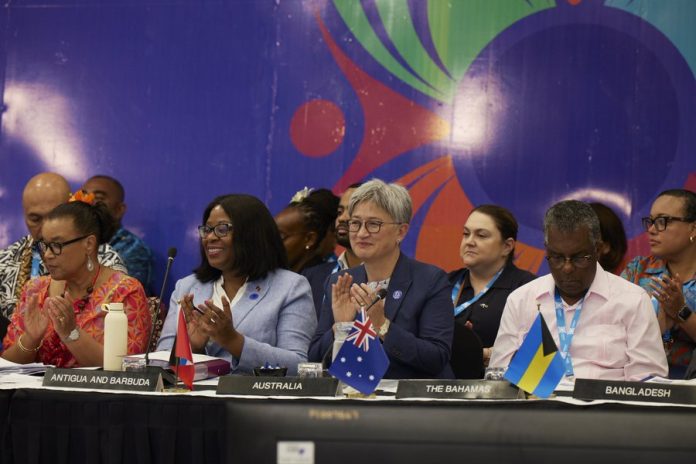A meeting of Commonwealth leaders in Samoa being presided over by King Charles has been labelled a “big deal for the Pacific” as countries plan to push issues of slavery and colonialism.
The environment, ocean health and economic development will be on the agenda.
Pacific nations, who are more susceptible to climate change, will continue to press leaders on phasing out fossil fuels.
Speaking from the Samoan capital Apia, Foreign Minister Penny Wong said it was the first time the Commonwealth Heads of Government Meeting had been held in a Pacific Island country.
“It’s a big deal for the Pacific and it’s why we’re so focused on backing in Samoa’s priorities … the majority of Small Island States are members of the Commonwealth,” she told ABC News Breakfast.
Senator Wong said the government was working with Pacific nations to increase climate resilience, and pointed to legislated “ambitious targets” to combat climate change.
“Australia has to reduce its emissions … if we are going to combat sea level rise, temperature rising, the whole world will have to peak and reduce emissions,” she said.
The Foreign Minister said she would raise the issue of gender equality at the meeting of leaders.
“This is an equity issue, this is an ethical issue, but it’s also a development issue,” she said.
“No country will achieve its full development unless it ensures it brings all of its people, including women and girls, to that task.”
Prime Minister Anthony Albanese will join King Charles and Queen Camilla, who will preside over their first Commonwealth meeting since taking the throne and directly following a royal tour of Australia.
The meetings “aren’t transformational” but the Pacific would be looking to build on connections to other regions and draw attention to the existential threat of rising sea levels, Pacific expert Meg Keen said.
“That’s not trivial, there’s 56 countries – about a third of the world’s population – there are not only leaders, there are key decision makers and, of course, there’s media,” Dr Keen told AAP.
Albanese will arrive in Samoa on Thursday afternoon and attend a welcome reception and banquet during the evening, to be hosted by Samoan officials.
Pacific nations would be looking to raise concerns before the COP environment conference in November and gather support for an International Court of Justice case on obligations states regarding climate change, she said.
Professor Jioji Ravulo, who specialises in Pacific communities, also framed climate as the main issue but said it was important Australia used its diplomatic clout to elevation regional voices.
Issues of gender equality, poverty and economic development “all come back to a common denominator, which is climate change”, he said.
Albanese said Australia “values the significant role Samoa plays in our region and the close partnership between our two countries” as he makes his first trip to the Pacific nation as leader.
While Canberra had a pivotal role in these conversations as a major regional voice, it should not use its weight to impose on Pacific partners and only operate “within the terms of what Australia wants”, Prof Ravulo said.
“It’s not a shared relationship, it’s one where Australia continues to create expectations,” he said, pointing to reports an NRL team agreement with Papua New Guinea would preclude Chinese security forces in the Pacific nation.













